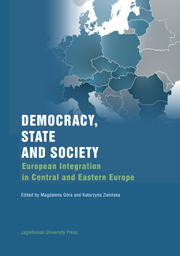Book contents
- Frontmatter
- Contents
- List of contributors
- Europeanisation in the EU New Member States. Aspects and Research Agendas
- Part one Democracy after Enlargement
- The Quality of Democracy
- Dilemmas of Europeanisation: Eastern and Central Europe after the EU Enlargement
- The Eastern Enlargement of the European Union: Challenges to Democracy?
- Political Elite Behaviour in Eastern Central Europe: Provoking Populism and Nationalism?
- From Democracy Fatigue to Populist Backlash
- Part two Identity Transformations
- Part three Civil Society Organisations in Central and Eastern Europe
- Part four Europeanisation of International Relations
- Index
Political Elite Behaviour in Eastern Central Europe: Provoking Populism and Nationalism?
from Part one - Democracy after Enlargement
Published online by Cambridge University Press: 05 September 2014
- Frontmatter
- Contents
- List of contributors
- Europeanisation in the EU New Member States. Aspects and Research Agendas
- Part one Democracy after Enlargement
- The Quality of Democracy
- Dilemmas of Europeanisation: Eastern and Central Europe after the EU Enlargement
- The Eastern Enlargement of the European Union: Challenges to Democracy?
- Political Elite Behaviour in Eastern Central Europe: Provoking Populism and Nationalism?
- From Democracy Fatigue to Populist Backlash
- Part two Identity Transformations
- Part three Civil Society Organisations in Central and Eastern Europe
- Part four Europeanisation of International Relations
- Index
Summary
Abstract: The political developments in Eastern Central Europe (ECE) question the political achievements connected to Europeanisation. This paper outlines the reasons for the growing populism and nationalism of ECE political elites. The author argues that political elite behaviour is one of the main causes of populist and nationalist developments. ECE political elites have internalised a “negative political culture” including unethical behaviour and an egoistic struggle for political power contradicting the principles of liberal democracy. Within a democratic framework, elites prefer populist and polarising power strategies and do not care that these undermine democratic national institutions. The article examines why political elites have turned away from the positive Europeanisation that culminated in EU accession. While political elites cooperated readily to become part of the European Union, they now increasingly oppose further political integration and tend to nationalise and polarise political issues, thus turning to a “negative Europeanisation” of their countries.
“The time for mental processing of the transformation has been too short”
– Václav HavelIntroduction
The transformation of state and society in Eastern Central Europe (ECE) – Poland, Hungary, the Czech Republic and Slovakia – toward democracy and Europeanisation seems to be a success story. These countries have overcome state socialism by founding pluralistic regimes, restructuring their economies and integrating into European structures.
- Type
- Chapter
- Information
- Democracy, State and SocietyEuropean Integration in Central and Eastern Europe, pp. 79 - 94Publisher: Jagiellonian University PressPrint publication year: 2011



